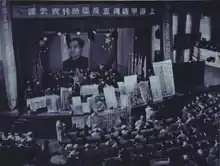Three-anti and Five-anti Campaigns
The Three-anti Campaign (1951) and Five-anti Campaign (1952) (Chinese: 三反五反; pinyin: sān fǎn wǔ fǎn) were reform movements originally issued by Mao Zedong a few years after the founding of the People's Republic of China in an effort to rid Chinese cities of corruption and enemies of the state. The result turned into a series of campaigns that consolidated Mao's power base by targeting political opponents and capitalists, especially wealthy capitalists.[1]
| Three-anti and Five-anti Campaigns | |
|---|---|
 A campaign conference in Shanghai (1952) | |
| Native name | 三反五反运动 |
| Location | China (Nationwide, concentrated in Beijing) |
| Date | 1952 January 1952 – April 1952 |
| Target | Allegedly corrupt officials, government bureaucrats, "bureaucraticism", capitalists and business owners |
Attack type | Political Persecution |
| Deaths | 100,000+ (allegedly through suicide) |
| Victims | 10,000 (Estimated) |
| Perpetrators | Chinese Communist Party, CCP Cadres, political fanatics |
| Motive | Attack of political opponents of Mao Zedong, the state bureaucracy, elimination of political enemies and consolidation of power |
The Three-anti campaign
| Three-anti and Five-anti Campaigns | |||||||||
|---|---|---|---|---|---|---|---|---|---|
| Simplified Chinese | 三反五反 | ||||||||
| Traditional Chinese | 三反五反 | ||||||||
| Literal meaning | Three-anti Campaign | ||||||||
| |||||||||
| History of the People's Republic of China |
|---|
.svg.png.webp) |
| History of |
|
|
The Three-anti Campaign was launched in Manchuria at the end of 1951. It was aimed at members within the Chinese Communist Party, former Kuomintang members and bureaucratic officials who were not party members.[2]
The 3 antis imposed were:
- anti-corruption (反贪污)
- anti-waste (反浪费)
- anti-bureaucracy (反官僚主义)[3]
The Five-anti campaign
The Five-Antis Campaign occurred in the midst of the Korean War and was a key campaign in the Communist Party's effort to eliminate private property.[4]: 163 It both extracted funds from the private sector to support China's involvement in the war and further restrained the power of Chinese capitalists.[4]: 163
The 5 antis were:
- anti-bribery (反行贿)[2]
- oppositional towards theft of state property (反盗骗国家财产)
- oppositional towards tax evasion (反偷税漏税)
- oppositional towards cheating on government contracts (反偷工减料)
- oppositional towards stealing state economic intelligence (反盗窃国家经济情报).
An estimated 20,000 cadres and 6,000 trained workers began spying on the business affairs of fellow citizens. The media encouraged compliance with the government policies. Up to 15,000 trained propagandists were working in Shanghai by late 1951.[2] By February 1952, parades of anti-Capitalist activists went door-to-door to visit business leaders. It created immense psychological pressure. Shanghai wards were set up to receive criticism letters from any employees. As many as 18,000 letters came in the first week of February 1952, and 210,000 came in by the end of the first month. Cadres of party members would join in on the attack. Some big companies would voluntarily make 1,000 confessions a day to try to protect themselves from the government.[2] A prime example was the Dahua copper company owner who originally over-confessed by claiming to have illegally obtained 50 million yuan. His employees continued to criticize the owner for greater crime until he reconfessed to having obtained 2 billion yuan.[2]
Aftermath
Many private business owners were fined during the Five-Antis campaign or prosecuted on charges such as tax evasion, bribery, misappropriation of public property, stealing state economic information, or cheating on labor materials.[4]: 163 As the Communist Party later acknowledged, the amount of illegal income attributed to those punished was often overestimated, and some of those punished were forced to confess, suffered physical violence, or were executed.[4]: 163–164
According to Mao, "We must probably execute 10,000 to several tens of thousands of embezzlers nationwide before we can solve the problem."[5] There were hundreds of thousands of suicides (though it is debatable whether many of these were voluntary) that were a direct result of these campaigns.[6] The campaigns negatively impacted the economy of big cities such as Shanghai, Tianjin and Chongqing, forcing many businessmen to commit suicide.[7][8][9][10] In Shanghai alone, from January 25 to April 1, 1952, at least 876 people committed suicide.[8][9][10]
Through these campaigns, the Communist Party demonstrated that it would no longer protect private business, and that Chinese capitalists would receive treatment no better than foreign.[2] The Korean War initially provided opportunities in Northern China, giving rise to a new class of capitalists, many of whom would be prosecuted under the Marxist policies of the Communist Party. Many of these people eventually borrowed money from the government to pay off government fines, creating a complex financial pattern.[2] A series of anti campaigns were launched by the Chinese government in the following years.[11]
References
- Dillon, Michael. [1998] (1998). China: A Historical and Cultural Dictionary. Routledge publishing. ISBN 0-7007-0439-6
- Spence, Jonathan D. [1991] (1991). The Search for Modern China. WW Norton & Company publishing. ISBN 0-393-30780-8
- Lawrence, Alan. [2003] (2003). China since 1919: Revolution and Reform: a Sourcebook. Routledge. ISBN 0-415-25142-7
- Dong, Madeline Yue (2022). "Nationalizing Food Provision in Beijing". In Altehenger, Jennifer; Ho, Denise Y. (eds.). Material Contradictions in Mao's China. Seattle: University of Washington Press. ISBN 978-0-295-75085-9.
- Changyu, Li. "Mao's "Killing Quotas." Human Rights in China (HRIC). 26 September 2005, at Shandong University" (PDF). Archived from the original (PDF) on 29 July 2009.
- Short, Philip (2001). Mao: A Life. Owl Books. p. 437. ISBN 0-8050-6638-1. Archived from the original on 2019-02-20. Retrieved 2016-06-04.
- Chen, Theodore Hsi-En; Chen, Wen-Hui C. (March 1953). "The 'Three-Anti' and 'Five-Anti' Movements in Communist China". Pacific Affairs. 26 (1): 3–23. doi:10.2307/2752900. JSTOR 2752900.
- Zhang, Ming. "执政的道德困境与突围之道——"三反五反"运动解析" (PDF) (in Chinese). Chinese University of Hong Kong.
- Liu, Yongfeng (2013-07-26). "那一年,中国商贾千人跳楼 全家共赴黄泉(图)". Sohu (in Chinese). Archived from the original on 2013-08-01. Retrieved 2019-11-22.
- Yang, Kuisong (2012-09-28). "三反五反:资产阶级命运的终结". Phoenix New Media (in Chinese). Archived from the original on 2017-10-31. Retrieved 2019-11-22.
- Fisac, Taciana and Fernández-Stembridge, Leila. [2003] (2003). China Today: Economic Reforms, Social Cohesion and Collective Identities. Routledge publishing. ISBN 0-415-31267-1